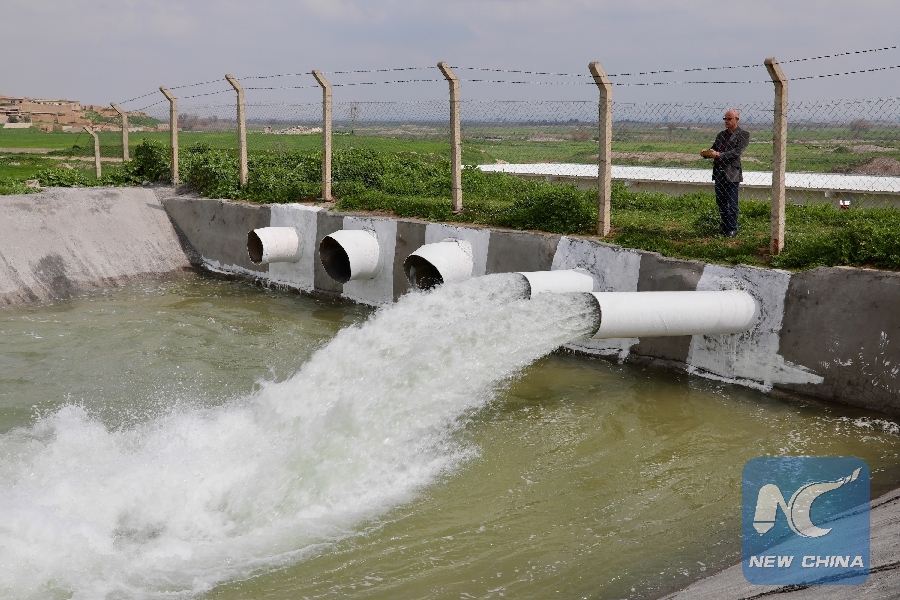
Picture taken on March 7, 2019 shows rehabilitated canal irrigation system in al-Namrud area in Nineveh Governorate,Iraq. (Xinhua)
BAGHDAD, March 22 (Xinhua) -- "My family and I are determined to work hard to regain our life on our old farm after the rehabilitation of the nearby canal," said Ismael Salih, a farmer from a village in the al-Namrud area to the southeast of Iraq's northern city of Mosul.
Salih, like many farmers in his area, left his home after the extremist Islamic State (IS) militant group seized the area in 2014 and damaged the Al Zab irrigation canal after they damaged its water pumps.
The farmers started to return to their villages and farmland because of the United Nations World Food Program (WFP)'s project in collaboration with Samaritan's Purse International Disaster Relief (SP) to restore a vital irrigation canal.
The canal draws water from the Great al-Zab River to vast agricultural lands southeast of Mosul.
Dressed in traditional Arab clothes, scrutinizing his field which now resembles a bright green carpet, Salih is expecting a good harvest of wheat for this winter season, the first harvest season since the canal was cleared and water started flowing again.
"I am preparing to plant nine dunams (22,500 square meters) of tomatoes, cucumbers, potatoes, eggplants and sunflowers for the summer season, now that WFP has provided us with much-needed water (from the canal) and assets to resume working in our farms," Salih said.
He received some 2,000 U.S. dollars to buy seeds and other agricultural equipment.
Sally Morson, agriculture and livelihoods program manager at non-governmental organization Samaritan's Purse, said the canal was pretty much destroyed.
"You can see the remnants of the other pumps, different parts and motors were removed," she said.
"In this project, we installed three new pumps and then rehabilitated other parts of the operation system. The plan is to continue the rehabilitation to restore its full capacity with five pumps," Morson added.
According to Salih, agriculture in his area has been greatly affected by the IS militants. Farmers couldn't even sell their crops to other parts of the country outside the IS control, which led to a sharp drop in crops prices, pushing many farmers to leave their lands.
The WFP and SP are cooperating on this resilience program designed to prompt the families of displaced farmers to return to their homes and rebuild their livelihoods.
They repaired the irrigation system, offered assistance to overcome farmers' difficulties resulting from the destruction of their farms after three years of being under IS control, as well as hands-on work opportunities to clear the rubble and physically rebuild the devastated waterways.
The initiative was welcomed by villagers who were encouraged to return to their work in the fields.
"Under the WFP program, we have cleaned the canals of the irrigation project and other remains of the battles against the IS," Yasir Tahir, an engineer working for SP, told Xinhua, explaining that more than 1,000 workers participated in the cleaning and repairing of the 69-km-long canal.
"We have purchased and installed three water pumps with a pumping capacity of one meter per second," Tahir said.
Tahir explained that the restored water system is now working efficiently and that farmers can irrigate their winter crops whenever they need.
The WFP will soon hand over the project to Nineveh's Water Resource Directorate.
Ali Abdullah, a foreman who supervised the cleaning process of the canals, said that hundreds of villagers have financially benefited from the project. With irrigation water restored, returnees are now able to resume their normal life in their farms.
"Recently, more than 100 families returned to their villages. Although most of their houses were destroyed, the availability of water from the canal gives them hope that they can go back to their normal life," Abdullah said.
With the al-Zab water channeled through the canals into the fields again, agriculture is reviving in the area. Farmers are able to cultivate grains and vegetables and market their products in nearby towns.
Among the returnees is Haider Ghayyeb, a displaced farmer who lived for several months in Debekha Camp for Internally Displaced People (IDPs) in Erbil province.
Ghayyeb said that he is not the only one that benefited from the project, as farmers from 15 villages have gained benefits from the irrigation revival scheme, which has brought renewed livelihoods.
"We have also received expertise and guidance on the prevention and control of plant diseases," Ghayyeb said.
In 1991, the al-Zab Irrigation Scheme was constructed by Nineveh's Department of Water Resource and was later developed and expanded in 2007.
Until the emergence of the IS group in 2014, the irrigation system had been fully functional, drawing water from the Great al-Zab River and channeling it almost 30 km through the main, upper, and lower canals.
These main canals then branched into 31 km of sub-canals, covering a total of 3,000 hectares, watering farmlands along the way.
The latest figures from the International Organization for Migration showed that some 1.74 million displaced people remained uprooted due to security concerns and a lack of shelter and livelihood opportunities.

